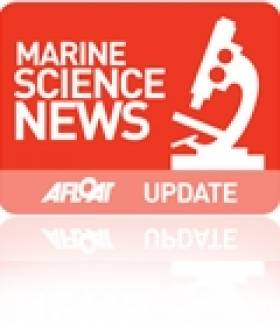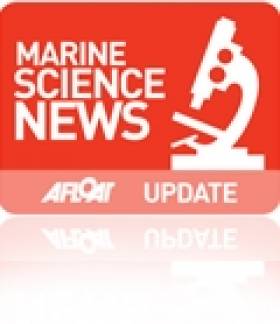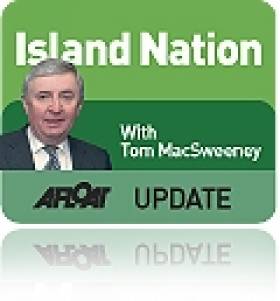Displaying items by tag: Agriculture
State support of €60 million for the improvement of water quality at local, catchment and national levels has been announced.
Through a WATER European Innovation Partnership (EIP) project, the Local Authority Waters Programme (LAWPRO) with Teagasc and Dairy Industry Ireland (DII) will work with farmers on an individual basis to improve water quality in Ireland’s waterways.
This will be achieved through the adoption of innovative practices in nutrient management, the application of nature-based Natural Water Retention Measures (NWRM) and other measures at farm level following the principles of integrated catchment management.
As an innovation partnership, measures will be designed and targeted specifically to address local challenges.
This is a collaborative approach between the Department of Agriculture, Food and the Marine with the Department of Housing, Local Government and Heritage in partnership with industry.
The Department of Agriculture, Food and the Marine, will support the project through the provision of technical assistance and funding of €50 million for participating farmers, co-funded by the National Exchequer and the EU under the Common Agricultural Policy. It expects to target 15,000 farmers in priority areas nationally.
The Department of Housing, Local Government and Heritage will provide administrative support and funding of €10 million. The Water EIP project, which will run until the end of 2027, has been awarded to the Local Authority Waters Programme (LAWPRO).
Minister for Agriculture, Food and the Marine, Charlie McConalogue said: “The agri-food industry is working together to improve water quality. However, there is a need to recognise farmers that invest above and beyond regulatory requirements to address specific localised water quality issues.
“This is the largest funding that my department has provided to a single EIP, recognising the importance of this project to enhancing sustainable agricultural practices and contributing in a significant way to improving water quality at a national level.”
Minister for Housing, Local Government and Heritage, Darragh O’Brien added: “I am delighted to join in this announcement…and particularly to note the collaborative process undertaken between the two departments in developing the Water EIP. The Water EIP is a highly significant project that will promote the adoption of innovative best practice in nutrient management and address a critical gap in measures to protect and restore water quality.”
Minister for Land Use and Biodiversity, Senator Pippa Hackett, noted: “The health and quality of our water is reflective of the health of our wider ecosystem, and pollution comes in many forms — with agriculture having a major influence.
“LAWPRO’s winning proposal will take a locally based approach, combining farm level actions with landscape features to deliver on the programme’s core aim of improving water quality, and also to provide a range of ecosystem co-benefits.
‘We know that the LAWPRO model is a model that works, for farmers and for water quality, so I am hugely excited to see what we can achieve by rolling it out at scale over the coming years.”
Minister of State with responsibility for Heritage, Malcolm Noonan also welcomed the funding announcement. “It will provide direct support to farmers and a vital link between the EPA’s catchment science, ASSAP advice and effective farm-level measures to protect and restore our waterways,” he said.
'The Sea: One of Ireland's Greatest Natural Resources' - Coveney
The Minister was speaking during a visit to the Marine Institute's research vessel, RV Celtic Explorer, on its return from a mission to the Labrador and Newfoundland Seas.
He added "I am particularly pleased that this is my first official engagement as Minister for Agriculture, Marine and Food. The work of the RV Celtic Explorer highlights the essential nature of marine research, development and sustainable management, through which Ireland is developing a strong and well-deserved reputation as an emerging centre of excellence, where we have prominent roles in many European and international marine science bodies."
Minister Coveney commended the Marine Institute and its Chief Executive, Dr Peter Heffernan, for its leading and proactive role in the areas of fisheries science, marine environment and food safety as well as ocean science and said that he looked forward to working closely with the Institute and benefitting from the research and advice which they would undertake and provide.
The Minister noted that Ireland's two national research vessels – RV Celtic Explorer and RV Celtic Voyager – will record 267 days at sea during 2011, during which they will be engaged in fisheries surveys, underwater mapping, climate studies and deepwater surveys.
Seeing the capabilities of Ireland's largest research vessel and the work of the Marine Institute, Mr Simon Coveney highlighted the importance the Marine Sector has on the Irish economy. "The seas and ocean that surround the land of Ireland is arguably one of our countries greatest natural resources. Through marine research, development and sustainable management, Ireland is developing a strong reputation as an emerging centre of excellence, where we have prominent roles in many European and international marine science bodies," he said.
Ireland's national research vessels RV Celtic Explorer and RV Celtic Voyager will record 627 days at sea between the two during 2011. Their work will range from fisheries surveys to underwater mapping and from climate studies to deepwater surveys with the remotely operated submersible ROV Holland 1.
"The work conducted on the vessels continues to feed into the success in attracting EU funding to Ireland's marine science programmes that have been achieved by our strategic approach to marine science planning" explained Dr Peter Heffernan, CEO of the Marine Institute.
"The award of funding projects shows that partnerships between academics and small businesses can yield significant dividends in creating jobs, generating economic revenue and the supply of raw materials for new industries ranging from ocean energy and environmental monitoring technologies to marine-inspired pharmaceuticals and food ingredients" he further said.
Marine is Back
It is a reminder which I hope that the media in general will note and that his tile of Marine will be used as often as agriculture is. The general media has been notorious, in my view, for disregarding the marine sector unless there is disaster, emergency or controversy involved.
The return of the title 'Marine' to a Government Department is, to put it bluntly, a kick-in-the-ass which civil servants needed. It was a betrayal of this island nation's heritage when those in charge of the former Department of Transport held a meeting which decided to remove the title marine from the Department's name, even though the then Minister had been assigned the role of Minister for Transport and Marine. The man in charge of that Department, Noel Dempsey, did not demonstrate a lot of interest in the marine, being more noted for trying to shut down the coastal radio stations at Valentia and Malin, where he was beaten off by public opposition, which also happened when he tried to remove 24-hour rescue helicopter service in the south-east and for his introduction of laws which criminalised fishermen.
Hopefully, the restoration of 'Marine' to a Department's name will be the harbinger of better things for the marine sphere.
I have heard some disappointment expressed that the marine is not a department on its own, but what the Fine Gael and subsequently Coalition Programme for Government agreed by Enda Kenny and Eamon Gilmore said was: "Marine responsibilities will be merged under one Department, for better co-ordination in policy delivery."
They have been, though some of the finer detail remains to be seen, such as will the ports be moved away from Transport, to where port companies and commercial interests originally campaigned to have them moved? And how will the split of marine tourism work between Agriculture and Marine and the separate tourism department? A similar issue may arise in regard to sailing and sport, but it seems to me a positive step that the disregard which Fianna Fáil and the Greens showed for the marine sector is being changed.
It was also right to end a separate department for defence. With a small army and navy, smaller than the marine sector, it was nonsense that it should have been a department of its own.
Let us therefore, hope for the future and take a positive view of the change as being for the better.
Simon Coveney Appointed Marine Minister
Cork sailor Simon Coveney (38) has been appointed as Minister of Agriculture, Food and Marine in the new cabinet of the Fine Gael/Labour Government formed yesterday.
The announcement has been welcomed by various marine interests pleased to see Marine back at the cabinet for the first time since the Department was dismantled by Fianna Fail's Bertie Ahern in 2002.
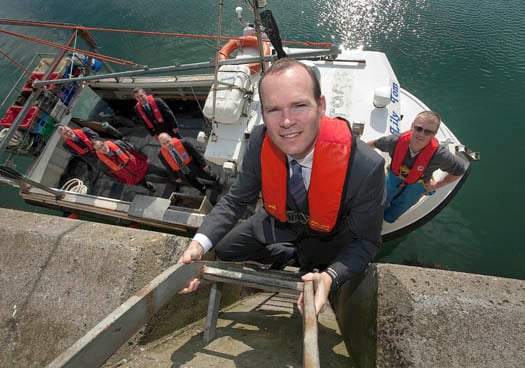
Marine Minister Simon Coveney TD
The appointment means Taoiseach Enda Kenny has kept good an election promise to reinstate the Marine department. A decade of lost opportunties has meant the sector has suffered through lack of infrastructure and coastline planning.
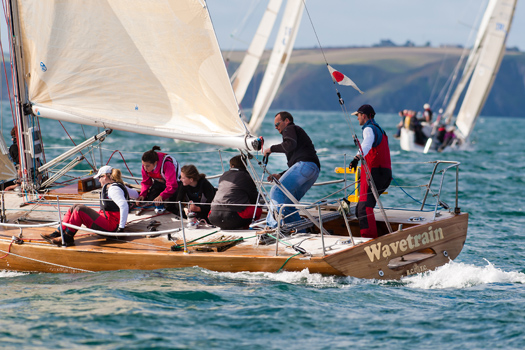
Simon Coveney at the helm of his yacht Wavetrain. Photo: Bob Bateman
"Simon is someone who understands the Sea as a sailor himself but also in his work as an MEP where he was involved in a number of major European maritime projects. This is a great opportuinty for the Marine. We look forward to working with him to develop this untapped resource." said David O'Brien of the Irish Marine Federation.
Simon was first elected to the Dáil in 1998 as one of Fine Gael's youngest TD's aged 26. He replaced his father Hugh Coveney TD following his untimely death.
Simon follows his father in to the post of Marine Minister. Hugh held the post in 1994.
Simon holds a B.Sc. in Agriculture and Land Management from Royal Agriculture College, Gloucestershire. He was also educated at Clongowes Wood College, County Kildare; University College Cork, and Gurteen Agricultural College, County Tipperary.
A keen fan of all competitive sport he has worked as a sailing instructor at his club Royal Cork Yacht Club in Crosshaven and been involved in many sailing regattas.
In 1997/8 he led the "Sail Chernobyl Project" which involved sailing a boat 30,000 miles around the world and raising €650,000 for charity.
In 2006 he contributed to RTE's series The Harbour and in a memorable quote, the Cork TD and former MEP said: "When somebody asks me the question, what's the one thing that's special about Cork?, I'd say the harbour."


























